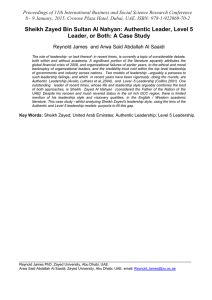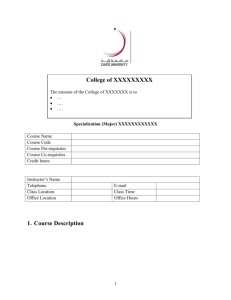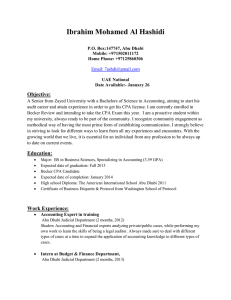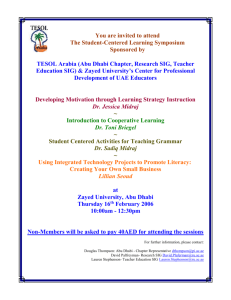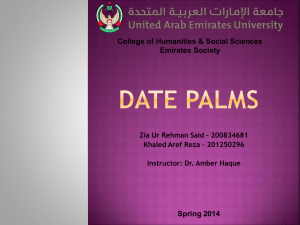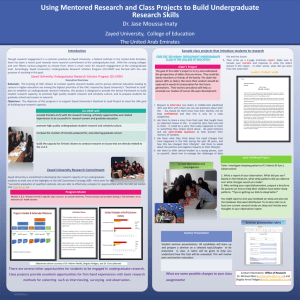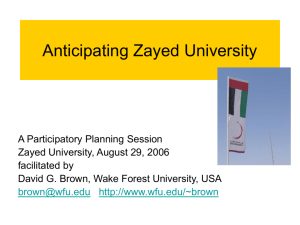What and How To Teach and Learn
advertisement
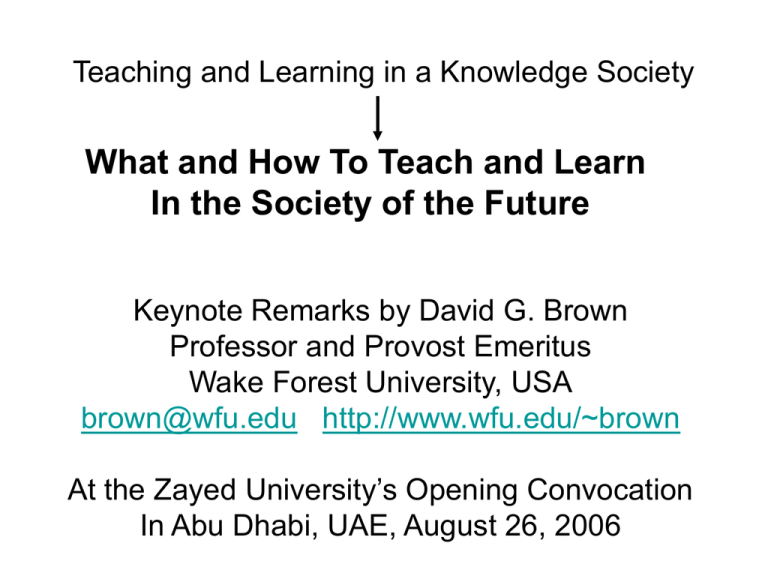
Teaching and Learning in a Knowledge Society What and How To Teach and Learn In the Society of the Future Keynote Remarks by David G. Brown Professor and Provost Emeritus Wake Forest University, USA brown@wfu.edu http://www.wfu.edu/~brown At the Zayed University’s Opening Convocation In Abu Dhabi, UAE, August 26, 2006 Student Teacher In tomorrow’s world, individuals will eclipse institutions. The best use of computers is to enhance communication. Outline of Remarks 1) Share what I’m doing– five specific techniques 2) Reveal why I’ve chosen these techniques and speculate about the future of “teaching and learning” 3) Reflect upon the successes and opportunities for Zayed University When (11 years ago) the committee I chaired decided that Wake Forest University would be the first major university in the world to provide identical laptop computers to all students, I had the opportunity-responsibility to rethink everything about my own teaching. Examples from My Teaching Before, During, & After The New Teaching Strategies 1. Communication-Interaction 2. Collaboration-Teams 3. Controversy-Debate 4. Customization-Diversity 5. Consultants-Adjuncts New “Student” Mentality • • • • • • • Immediacy…Always in Touch Interactivity Multi-Tasking…Channel Changing Visual Learners Open Information Shared Authority & Second Opinions Nintendo Problem Solving New Faculty Roles • Less Content Transmission: More Access & Evaluation Strategy + Applications (Practice) • Certifying & Sequencing Learning Strategy • Forming & Monitoring Learning Groups • Less Control (More Textbook-like Supplements, Alternate Authorities, Less Standardization, Competitive Options) • Open for Inspection • Continuous Interaction (Never Ending) • Collaborative Teaching (with content specialists, designers, students) By Don Tapsott Factor Traditional Proposed Educational Outcome Classsroom Focal Point Learning Model Content Faculty Role Faculty Presence Academic Calendar Institution Student Populations Degree Physical Faculty Presentation Standardized Transmit Information Individual/Autonomous Fixed Centralized On Campus Competency Virtual Students Discovery Individualized Facilitate Learning Teams Flexible Decentralized Global Source: Don Tapscott Thinking Ahead---the future of teaching and learning • Personal. Customized. Interactive. • Student-Centered Curriculum • Teams of Professionals to Support Learning • “Houses” instead of Disciplines • Hybrid Courses (80-20 and 20-80) • Loose-leaf Collections of Course Components, instead of Textbooks Your Job at Zayed University: To Prepare students to lead! (knowledge, tools, self confidence) According to my studies of American university presidents, successful leaders--- 1. Have a set of principles that inform their decisions 2. Know the principles 3. Communicate the principles to others Sources: David G. Brown, Leadership Vitality, ACE, 1979. David G. Brown, University Presidents As Moral Leaders, ACE, 2006. The Zayed Strategy Aspiring to be the Best in the REGION • • • • • • • • • • High Admission Standards High Expectations (Rigorous Standards) Common Intellectual Heritage (COIL) Bi-Lingual Graduates Computer Proficient Graduates Highly Credentialed Faculty Measurable Outcomes High Student Aspirations Students First Everybody Cares Zayed’s Comparative Advantage • • • • • • • Multi-cultural Leadership Willing to Learn from Others Global Perspective Practical, Project Centered Learning Avoid Pre-Computer Heritages Adopt Newly Affirmed Learning Strategies World Eager for Bridges (Arab/Christian, Inheritance/Entrepreneur, Female/Male) • Talented Students If Not At Zayed University, Where In the Gulf Region Will Society... • • • • • • • • • • • Certify & Label New Talent? House “out of season” Ideas? Motivate New Learners? Evaluate Information? Archive Ideas? Nurture Values and Cultural Sensitivities? Induce Young People To Invest In Themselves? Protect Maturing Learners & Experimenters? Form Friendships and Networks? Build Public Monuments? Attract Quality Jobs? Review • Our job is to nurture leaders, specifically to enable them to exude PRINCIPLES--Have them, Know them, Communicate them • Good pedagogy emphasizes high standards, extensive communication and collaboration. • The computer is a powerful teaching tool that, when used properly, can greatly facilitate learning. • As we move forward into the Knowledge Society customization will become increasingly important. • Zayed’s opportunity is IMMENSE! Congratulations and Good Luck
